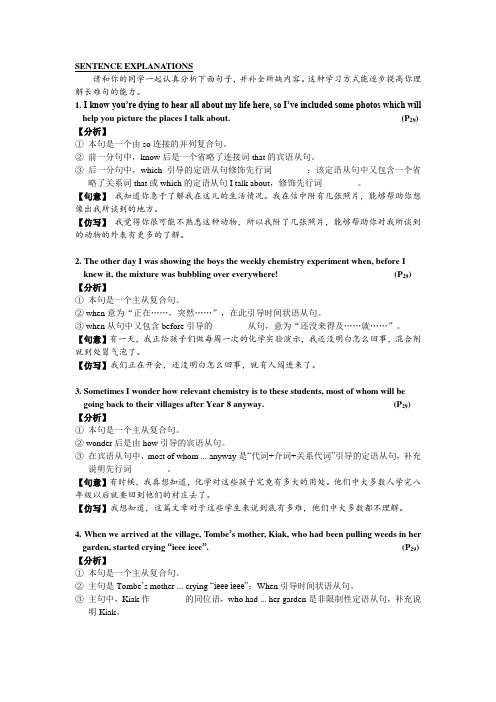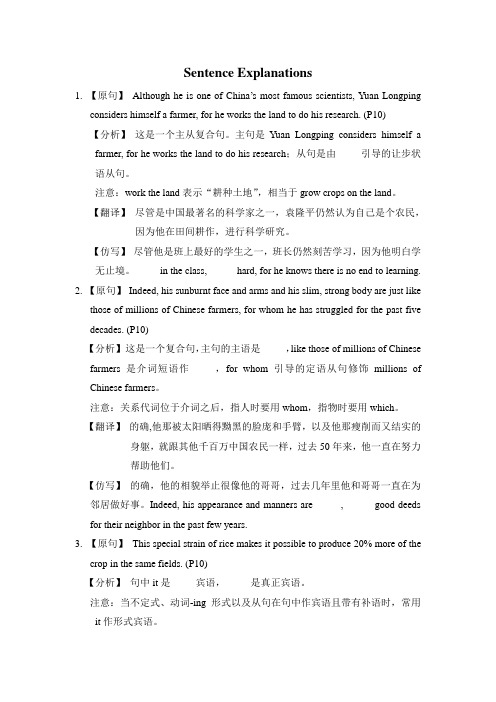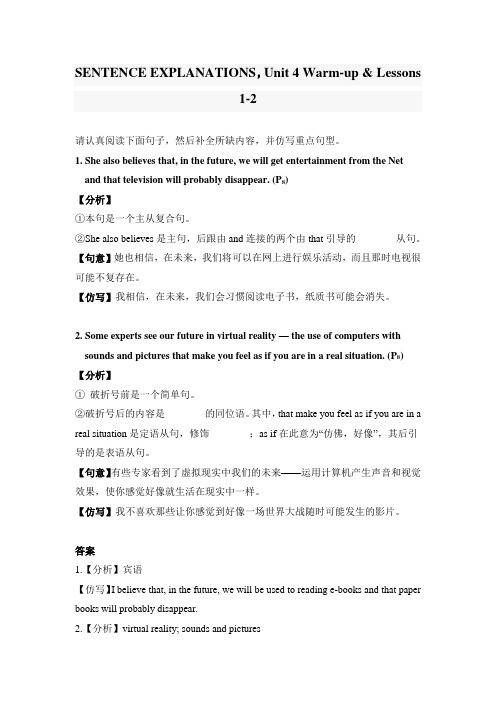高中英语Unit4Lessons1_2SentenceExplanation练习北师大版必修2
- 格式:doc
- 大小:112.00 KB
- 文档页数:2

SENTENCE EXPLANATIONS请和你的同学一起认真分析下列句子,补全所缺内容并进行仿写。
这种学习方式不仅能逐步提高你理解长难句的能力而且能提高你的写作能力。
1. 【原句】Please take me to a distant land where I can find the animal that gave fur to make this sweater. (P26)【分析】这是一个复合句,主句是祈使句;where和that引导的是定语从句,分别修饰_____和_____。
【翻译】请带我到遥远的地方,在那里我可以找到为制作这件毛衣提供毛绒的那种动物。
【仿写】请带我去一下学校,在那里我可以与上星期给我们作过演讲的老师见个面。
Please take me to the school ___________ gave us a talk last week.【高考链接】A bank is the place _____ they lend you an umbrella in fair weather and ask for it back when it begins to rain.A. whenB. thatC. whereD. there2.【原句】They allowed tourists to hunt only a certain number of animals if they paid the farmers. (P26)【分析】这是一个复合句。
They allowed ... animals是主句,_____引导条件状语从句。
注意:①主句中allow后跟带to的不定式作宾补,其后也可跟动词-ing形式作宾语。
②主句中的a certain number of意为“一定数量的”,而a number of意为“大量的,许多的”,修饰可数名词复数,作主语时,谓语动词用_____形式;另外the number of意为“……的数量”,也修饰可数名词复数,作主语时,谓语动词用_____形式。

SENTENCE EXPLANATIONS请和你的同学一起认真分析下面句子,并补全所缺内容。
这种学习方式能逐步提高你理解长难句的能力。
1. I know you’re dying to hear all about my life here, so I’ve included some photos which will help you picture the places I talk about. (P29)【分析】①本句是一个由so连接的并列复合句。
②前一分句中,know后是一个省略了连接词that的宾语从句。
③后一分句中,which引导的定语从句修饰先行词________;该定语从句中又包含一个省略了关系词that或which的定语从句I talk about,修饰先行词________。
【句意】我知道你急于了解我在这儿的生活情况。
我在信中附有几张照片,能够帮助你想像出我所谈到的地方。
【仿写】我觉得你很可能不熟悉这种动物,所以我附了几张照片,能够帮助你对我所谈到的动物的外表有更多的了解。
____________________________________________________________2. The other day I was showing the boys the weekly chemistry experiment when, before I knew it, the mixture was bubbling over everywhere! (P29)【分析】①本句是一个主从复合句。
② when意为“正在……,突然……”,在此引导时间状语从句。
③ when从句中又包含before引导的________从句,意为“还没来得及……就……”。
【句意】有一天,我正给孩子们做每周一次的化学实验演示,我还没明白怎么回事,混合剂就到处冒气泡了。
【仿写】我们正在开会,还没明白怎么回事,就有人闯进来了。


2021年高中英语 Unit4 Sentence Explanation讲练新人教版必修2 1.Please take me to a distant land where I can find the animal thatgave fur to make this sweater.) (P26【分析】①本句是一个主从复合句。
②主句是Please take me to a distant land,where引导________从句。
③在where引导的从句中包含一个由that引导的定语从句,修饰先行词animal。
【句意】请带我到遥远的地方,在那里我可以发现为制作这件毛衣而提供毛绒的那种动物。
【仿写】汤姆昨天带我去了一家书店,在那里我买了一本描写中国文化的书。
____________________________________________________________2. They allowed tourists to hunt only a certain number of animals if theypaidthefarmers.)(P26【分析】①本句是一个主从复合句。
②主句是They allowed tourists to hunt only a certain number of animals;allow sb. to do sth. 意为“允许某人做某事”。
③从句是if引导的条件状语从句。
【句意】如果游客付给农民钱的话,他们允许游客猎取一定数量的动物。
【仿写】如果简及时归还的话,汤姆允许她使用自己的字典。
____________________________________________________________3. It shows the importance of wildlife protection, but I’d like to helpastheWWFsuggests.)(P26【分析】①本句是一个由but连接的并列复合句。

Sentence Explanations1. 【原句】Although he is one of China’s most famous scientists, Yuan Longpingconsiders himself a farmer, for he works the land to do his research. (P10)【分析】这是一个主从复合句。
主句是Yuan Longping considers himself a farmer, for he works the land to do his research;从句是由_____引导的让步状语从句。
注意:work the land表示“耕种土地”,相当于grow crops on the land。
【翻译】尽管是中国最著名的科学家之一,袁隆平仍然认为自己是个农民,因为他在田间耕作,进行科学研究。
【仿写】尽管他是班上最好的学生之一,班长仍然刻苦学习,因为他明白学无止境。
_____ in the class, _____ hard, for he knows there is no end to learning.2. 【原句】Indeed, his sunburnt face and arms and his slim, strong body are just likethose of millions of Chinese farmers, for whom he has struggled for the past five decades. (P10)【分析】这是一个复合句,主句的主语是_____,like those of millions of Chinese farmers是介词短语作_____,for whom引导的定语从句修饰millions of Chinese farmers。
注意:关系代词位于介词之后,指人时要用whom,指物时要用which。

SENTENCE EXPLANATIONS,Unit 4 Warm-up & Lessons1-2请认真阅读下面句子,然后补全所缺内容,并仿写重点句型。
1. She also believes that, in the future, we will get entertainment from the Net and that television will probably disappear. (P8)【分析】①本句是一个主从复合句。
②She also believes是主句,后跟由and连接的两个由that引导的________从句。
【句意】她也相信,在未来,我们将可以在网上进行娱乐活动,而且那时电视很可能不复存在。
【仿写】我相信,在未来,我们会习惯阅读电子书,纸质书可能会消失。
_____________________________________________________________________ 2. Some experts see our future in virtual reality — the use of computers with sounds and pictures that make you feel as if you are in a real situation. (P8)【分析】①破折号前是一个简单句。
②破折号后的内容是________的同位语。
其中,that make you feel as if you are in a real situation是定语从句,修饰________;as if在此意为“仿佛,好像”,其后引导的是表语从句。
【句意】有些专家看到了虚拟现实中我们的未来——运用计算机产生声音和视觉效果,使你感觉好像就生活在现实中一样。
【仿写】我不喜欢那些让你感觉到好像一场世界大战随时可能发生的影片。
_____________________________________________________________________ 答案1.【分析】宾语【仿写】I believe that, in the future, we will be used to reading e-books and that paper books will probably disappear.2.【分析】virtual reality; sounds and pictures【仿写】I don’t like films that make you feel as if a world war could happen any time.SENTENCE EXPLANATIONS Unit 4 Lessons 3-4 &Communication Workshop请认真阅读下面句子,然后补全所缺内容,并仿写重点句型。
高中英语学习材料(灿若寒星*制作整理)SENTENCE EXPLANATIONS1. But the one million people of the city, who thought little of these events, were asleepas usual that night. (P26)【分析】①本句是一个主从复合句。
②主句是the one million people of the city were asleep as usual that night,who引导非限制性定语从句,修饰先行词________。
③think little of意为“轻视,不重视”。
【句意】但是,唐山市的一百万居民几乎都没有把这些情况当回事,当天晚上照常睡着了。
【仿写】这些孩子们几乎都没有把他的话当回事,照常在河里游泳。
____________________________________________________________2. Everywhere they looked nearly everything was destroyed. (P26)【分析】①本句是一个主从复合句。
②主句是nearly everything was destroyed,从句是Everywhere they looked。
③Everywhere在此用作连词,引导地点状语从句。
【句意】人们随处看到的一切几乎都被毁了。
【仿写】我走到哪里,我女儿就跟到哪里。
____________________________________________________________3.Then, later that afternoon, another big quake which was almost as strong as the first oneshook Tangshan. (P26) 【分析】①本句是一个主从复合句。
Unit 4 Body LanguageWarming up and reading白璐璐(一)there dimensional teaching aimsKnowledge and skill:1. Let the students know more about body language.2. Let the students can talk about body language freely.Ability aims:1. Encourage students to think about body language and talk about it.2. Learn to respect other cultures.3. Train students’ speaking ability through individual and group work.Emotional aims:1. To arise students’ interest in learning English.2. Let students have a better understanding of different customs.(二) Teaching important points1. Master language points and can use them to talk about body language.2. Learn to show respect to other cultures.(三) Teaching difficult points1. Talk about body language with partners by using new expressions.2. Have a better understanding of the whole passage.(四) Teaching methods1. Task-based teaching and learning.2. Pair work or group work to make every student learn in class.3. Asking-and- answering activity to help students understand the words andphrases.(五) Teaching aids:Blackboard and PPT(六) Teaching proceduresStep 1 GreetingToday we are going to use a different way to start our class, you guys need look at me and I will do some acting, you guys need do what I want you to do.Step 2 lead-in1. The definition of body language: a form of communication without using anywords.Body language: gesture, eye contact, facial expression, postureStep 3 warming up1. Different ways to meet or partShow some pictures about how to greet and how to say goodbye to each other.2. Do the gestureShow some picture about gesture and give the explanation of its different meanings. Step 4 ReadingTask 1 Fast readingRead the passage carefully and divide the passage into 4 parts. Match the main idea of each part.Para 1 A.Different people have different body language.Para 2&3 B. Summary of body language.Para 4 C. Meet the visitors at the airport.Para 5 D. People from different countries express greetings in differentways.Task 2 careful readingRead the first paragraph carefully and finish the T or F questions( T ) 1. Yesterday, another student and I, representing our university's student association, went to the Capital International Airport to meet this year'sinternational students.( F ) 2. After an hour of waiting for their flight to arrive, I saw several young people enter the waiting area looking around curiously.( T ) 3. I stood for a minute watching them and then went to greet them.Read the second and third paragraph carefully and match the left with the right column.Mr Garcia (Columbia) Julia Smith (Britain)Darlene Coulon (France) Akria Nagata (Japan)George Cook (Canada) 1.shakes hands and kisses others twiceon each cheek2.approaches others closely andtouches their shoulder and kissesthem on the cheek3.does not stand very close to others ortouch strangers4.bows5.shakes handFind out the two mistakes the writer found in the airport: Mr. Garcia from He approaches Ms Smith(Columbia)________ The firstmistakeJulia Smith from She ______ ________ appearing_________Garcia.a Japanese He ________ to Mr. Cook and his nose _________ Mr.Cook’s _______ ________.The secondmistakeJapanese.Task 3. careful readingListen the rest part carefully and choose the right answer.1.Besides spoken language, people also use “unspoken language” through___.A.physical distanceB. actionsC. postureD. all above2. ___ prefer to bow rather than kiss others on the cheek.A.The FrenchB. The JapaneseC. The AmericanD. The Chinese3. Which countries approach others closely expect___.A. AmericaB. SpainC. ItalyD. England4. Why do we need study international customs?A.avoid difficultiesB. for funC.go to study abroadD. international communicationTask 4 Post readingAnswer the following questions1. “When in Rome, do as the Romans do.” What do you think this famous saying means?This saying means that when we are in a certain place, we should follow the customs of the people who live in that place, not our own customs.2. Did any students have similar greeting customs? If so, which ones?Yes. Tony from Colombia and Darlene from France had a similar greeting custom—a kiss. George from Canada and Ahmed from Jordan also had a similar greeting custom—a handshake, but Ahmed shakes hands only with men.Step 5 DiscussionGive a speech about how different countries greet others. Your speech should include the following information.You may start like this:It is my great honor to give you a speech here.As we all know ,not all cultures greet each other the same way. In France, …It’s necessary to learn about some body language, because it can reduce some misunderstanding and avoid difficulties in communications.Step 6 Daily sentencesWhen in Rome, do as the Romans doStep 7 EntertainmentCan you guess what the following gesture from Japan means?Step 8 Homework➢Recite the new words of unit 4 and prepare for next period.➢Finish the exercise I on page 27➢内容总结➢➢。
请和你的同学一起认真分析下列句子,并补全所缺内容。
这种学习方式能逐步提高你理解长难句的能力。
1. Whichever and whatever you like, there is a theme park for you! (P34)【分析】本句是一个主从复合句。
Whichever and whatever you like是让步状语从句,there is a theme park for you是主句。
whichever / whatever / whoever (无论哪个/无论什么/无论谁)既可以引导让步状语从句(相当于no matter which / no matter what / no matter who引导的让步状语从句),又可以引导名词性从句。
如:Whichever way you look at it, things are pretty bad.= No matter which way you look at it, things are pretty bad.Whichever of you gets here first will get the prize.=Any one of you who gets here first will get the prize.【仿写】①不论发生什么事都要保持镇静。
______________________________②谁想要这票,我就把它给谁。
______________________________2. It will bring you into a magical world and make your dreams come true, whether you are travelling through space, visiting a pirate ship or meeting your favourite fairy tale or Disney cartoon character. (P34)【分析】本句是一个主从复合句。
新高一英语第四课知识点New High School English Lesson 4: Key PointsIn the fourth lesson of the new high school English curriculum, students will be introduced to several key points that are essential for their understanding and development in the English language. These key points encompass various aspects, including vocabulary, grammar, reading comprehension, and speaking skills. Through a comprehensive study of these points, students will gain a solid foundation in English and enhance their overall language proficiency. Let's delve into the specifics of each key point.1. Vocabulary Expansion:Vocabulary plays a fundamental role in language acquisition. In this lesson, students will be exposed to a wide range of new words and phrases, covering various topics such as daily routines, hobbies, and interests. Through interactive exercises, including word association, matching activities, and contextual usage, students will be able to expand their vocabulary repertoire effectively.2. Grammar Application:Grammar forms the backbone of any language. In Lesson 4, students will focus on consolidating their understanding and application of basic grammar structures, including verb tenses (present simple, present continuous) and sentence formation (subject-verb-object). By analyzing sentence patterns, practicing sentence transformations, and engaging in interactive grammar drills, students will develop a solid grasp of fundamental English grammar rules.3. Reading Comprehension:Developing reading skills is crucial for students to comprehend English texts effectively. In this lesson, students will engage in various reading activities that aim to improve their reading comprehension abilities. They will read a variety of texts, including narrative passages, newspaper articles, and informational texts, followed by comprehension questions and discussions. This approach will enhance students' ability to extract information, infer meaning, and draw conclusions from written material.4. Speaking Practice:Fluency in speaking is vital for effective communication. Lesson 4 incorporates speaking activities that encourage students to express their thoughts and opinions confidently. Through role-plays, small group discussions, and presentations, students will develop theirspeaking skills, including pronunciation, intonation, and fluency. Moreover, these activities will foster critical thinking and allow students to engage in meaningful conversations in English.To facilitate students' learning and ensure effective absorption of these key points, the lesson will employ a variety of teaching methods and resources. These may include multimedia presentations, audio recordings, interactive online platforms, and collaborative learning experiences. Additionally, continuous assessment and feedback will be provided to monitor students' progress and address any areas of difficulty.In conclusion, Lesson 4 of the new high school English curriculum focuses on essential key points that form the foundation for students' language development. Through vocabulary expansion, grammar application, reading comprehension exercises, and speaking practice, students will acquire a solid grasp of English language skills. With regular practice and engagement, students will become more confident and proficient in their English proficiency, paving the way for successful communication and future language growth.。
SENTENCE EXPLANATIONS
请和你的同学一起认真分析下面句子,并补全所缺内容。
这种学习方式能逐步提高你
理解长难句的能力。
1. In the future, ter rorists may “attack” the world’s computers, cause c haos,
and make planes and trains crash.
(P8)
【分析】本句是一个简单句。
In the future是时间状语,terrorists是主语,“attack”,
cause以及make并列作谓语动词。
crash是省略了to 的不定式作宾语补足语。
常见的后用
不带to的不定式作宾语补足语的动词还有:feel, see, hear, watch, notice, let, have
等。
【句意】将来,恐怖分子可能会“攻击”全世界的计算机,制造混乱,引发飞机和火车事故。
【仿写】①Amy _________________ (做了一顿晚饭,洗了衣服并照顾她的小妹妹)
yesterday.
②They _________________ (让那个男孩早早去睡觉).
2.She also believes that, in the future, we will get entertainment from the Net
and that television will probably disappear.
(P8)
【分析】本句是一个主从复合句。
She also believes是主句,后跟由and连接的两个并列
的宾语从句。
在口语或非正式文体中引导宾语从句的that常被省略,但是如果有两个或两
个以上由that引导的从句作宾语时,除第一个that可省略外,其余的that都不能省略。
【句意】她也相信,在未来,我们将可以在网上进行娱乐活动,而且电视很可能会不复存在。
【仿写】He firmly believes ______________________ (政府将会帮助他们,这项工程会成功).
3. Some experts see our future in virtual reality — the use of computers with
sounds and pictures that make you feel as if you are in a real situation. (P8) 【分析】破折号前是一个简单句。
破折号后的内容是________的同位语,其中,
make you feel as if you are in a real situation 是定语从句,修饰________。
as
if意为“仿佛,好像”,可用来引导方式状语从句或表语从句, 从句的谓语动词可用陈述
语气或虚拟语气。
如:
She loves the boy as if she were his mother.
I t seems as if our team is going to win.
【句意】有些专家在虚拟现实中看到了我们的未来——运用计算机产生声音和视觉效果,
使你感觉好像就生活在现实中一样。
【仿写】He behaved ______________________ (好像什么都没发生).
4. I see people living and working in a virtual world.
(P8)
【分析】本句是一个简单句。
see sb. doing sth.意为“看见某人正在做某事”。
有类似用
法的动词还有watch, notice, hear等。
【句意】我看到人们在虚拟世界里生活和工作。
【仿写】I could see her ______________________ (站在我们屋外).
KEY:
SENTENCE EXPL ANATIONS
1.【仿写】①cooked an evening meal, washed cl othes and looked after her younger sister
②made the boy go to bed early
2.【仿写】(that) the government will help them and that the project will be a success
3. 【分析】virtual reality;computers
【仿写】as if nothing had happened
4.【仿写】standing outside our house / room。